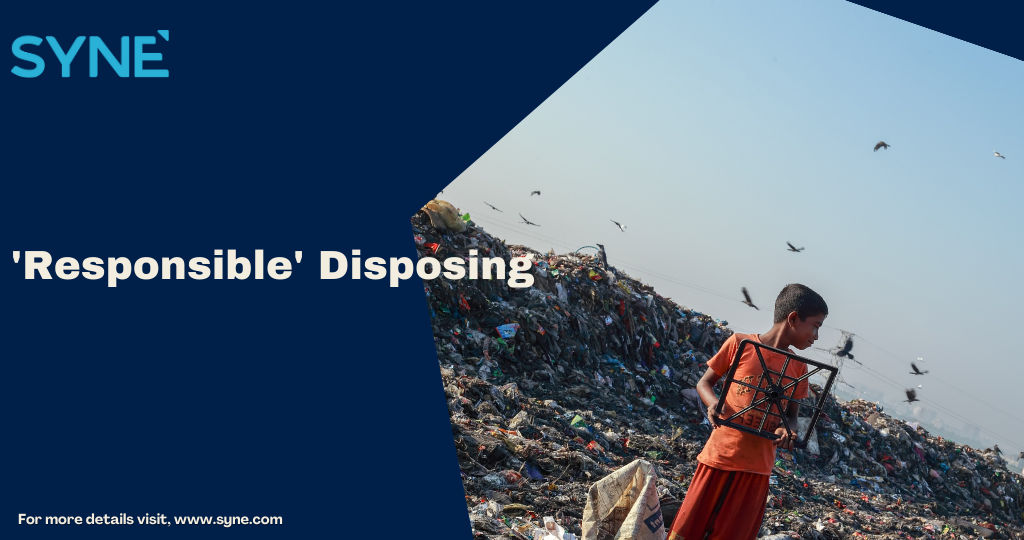Responsible Disposing of Waste
Environment
CREATED
09 Jun 2023
syne.com/story/responsible-disposing...
Landfilling of Waste and adverse Impact on Climate Action
The world is grappling with the pressing challenge of climate change, necessitating urgent action to mitigate its far-reaching consequences. While efforts are being made to reduce greenhouse gas emissions and transition to renewable energy sources, one critical aspect that often goes overlooked is the detrimental impact of landfilling waste on climate action. Here we look at how landfilling waste poses a significant threat to our climate goals, highlighting the urgent need for alternative waste management strategies.
Greenhouse Gas Emissions:
Landfills are notorious contributors to greenhouse gas emissions, primarily through the release of methane. As organic waste decomposes in oxygen-deprived conditions, it produces methane gas, a greenhouse gas with a significantly higher global warming potential than carbon dioxide. In fact, they are one of the largest human-made sources of methane emissions worldwide. As the global population grows and waste production increases, the volume of methane released from landfills will continue to rise, exacerbating climate change.
Lost Resources:
By consigning valuable materials to landfills, we squander the opportunity to conserve resources and reduce energy consumption. Materials such as metals, plastics, and paper can be recycled or reused, but when they end up in landfills, they remain buried and inaccessible. This wastage of resources perpetuates a linear consumption model, contributing to the depletion of finite resources and perpetuating environmentally harmful extraction and production processes.
Space Constraints and Environmental Impacts:
The growing volume of waste necessitates ever-expanding landfill sites, requiring vast areas of land. As cities expand and populations rise, finding suitable land for landfills becomes increasingly challenging. This leads to deforestation, habitat destruction, and the loss of biodiversity. Additionally, the space occupied by landfills could have been utilized for more sustainable purposes, such as renewable energy generation, urban green spaces, or agriculture.
Water Pollution:
Landfills produce leachate, a toxic liquid that results from the decomposition of waste. If not properly managed, leachate can seep into the surrounding soil and contaminate groundwater and nearby water bodies. The pollution of water sources poses risks to human health, disrupts ecosystems, and further compounds the environmental impacts of landfilling.
Addressing the Threat: Mitigation Strategies
It is always easy to state the issues, how we handle them and methods chosen play a bigger part. To combat the looming threat posed by landfilling waste to climate action, several mitigation strategies can be pursued:
Waste Reduction and Recycling:
Fostering a culture of waste reduction and recycling is crucial in minimizing the amount of waste destined for landfills. Governments, organizations, and individuals must prioritize waste reduction efforts through initiatives such as source separation, composting, and promoting the use of reusable products. Robust recycling programs, coupled with efficient collection and sorting infrastructure, can divert significant amounts of waste from landfills.
Waste-to-Energy and Anaerobic Digestion
Investing in waste-to-energy technologies, such as incineration with energy recovery, can help transform non-recyclable waste into renewable energy sources. Similarly, anaerobic digestion can break down organic waste, producing biogas that can be utilized for energy generation. These technologies not only reduce methane emissions but also contribute to the transition to a circular economy by extracting value from waste.
Landfill Gas Capture:
Installing landfill gas collection systems allows for the capture and utilization of methane emissions from landfills. This captured methane can be converted into energy sources, mitigating its harmful impact on the climate. By implementing these systems, we can harness the potential of methane as a renewable energy resource while minimizing its release into the atmosphere.
Policy and Regulations:
Governments should enact comprehensive waste management policies and regulations that prioritize waste reduction, recycling, and diversion from landfills. Stricter landfilling regulations can incentivize sustainable waste practices while imposing penalties for non-compliance. Economic incentives, such as tax breaks or subsidies, can also encourage industries and individuals to adopt more environmentally friendly waste management practices.
Clearly, landfilling waste is a significant threat to climate action, with its adverse impacts ranging from greenhouse gas emissions and resource depletion to habitat destruction and water pollution. To tackle this effectively, a multi-faceted approach is required, emphasizing waste reduction, recycling, and the adoption of innovative waste management technologies. By implementing these strategies and transitioning to more sustainable waste practices, we can mitigate the threat posed by landfilling waste and work towards a more climate-resilient future.




View Comments